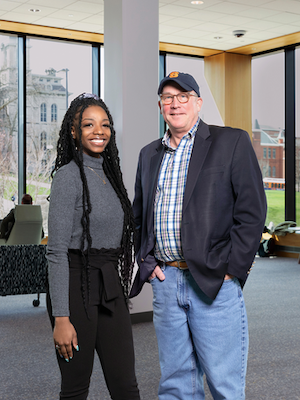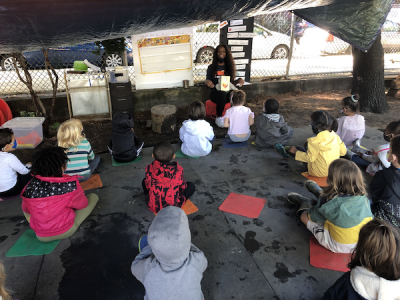In Brooklyn’s Fort Greene Park, there’s a small garden where Syracuse University senior Ashanti Hunter ’22 has helped kindergarteners blossom.

The children attend Community Roots, a local charter academy that utilizes an outdoor learning approach called Forest School. Last fall, they and Hunter visited the park biweekly and spent one day a week in the school’s outdoor classroom. In addition to working on academic content, the students learned the fine art of teamwork, problem solving and risk taking. They also did a little gardening.
Immersive experiences like Forest School bring out the best in kids—socially, emotionally and intellectually, Hunter explains. For those with and without disabilities, outdoor learning can improve self-esteem and sensory function.
“Forest School proves there isn’t a single route to success for students with disabilities,” says Hunter, who majors in inclusive early childhood special education in the School of Education. “Its holistic approach works in tandem with teachers and parents to contribute to children’s growth and development.”
Hunter recalls spending weeks tracking the behavioral progress of one student on the autism spectrum. After gathering and analyzing data, she shared her findings with the child’s parents, who, in turn, implemented her recommendations at home. “The positive results we saw carried over into other areas of the student’s life,” Hunter recalls.
Whether playing tag, making art or adding specimens to the class’s “worm club,” Hunter likes to get her hands dirty, helping diverse students find common ground. “Community Roots has inspired me to build my own successful, inclusive classroom,” says the aspiring elementary school teacher. “I can’t wait to graduate and get started.”
“As a Black woman and future educator, I want to change the narrative of women making the transition from teaching to administration.”
Sharpening Skills, Broadening Perspectives

Hunter got involved with Community Roots through SOE’s Bridge to the City program, which grants qualified seniors two seven-week placements in New York City schools. Afterward, she student-taught at P.S. 212: Midtown West, located in one of Manhattan’s more diverse neighborhoods. “Ashanti is an incredible teaching candidate,” says Assistant Teaching Professor Thomas Bull G’90. “Experiences like Forest School have enabled her to learn and teach in an exciting and demanding urban environment.”
At both schools, Hunter worked in an Integrated Co-Teaching (ICT) classroom, where students with and without disabilities were co-taught by two teachers. George Theoharis, professor of educational leadership as well as inclusive elementary and early childhood education, says ICTs support Hunter’s beliefs and SOE’s guiding philosophy. “Only strong students like Ashanti are selected for Bridge to the City. Co-teaching with different teams in New York City gave her invaluable experience, which she soaked up” …
